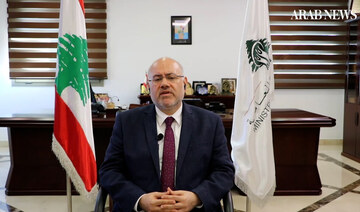
- ARAB NEWS
- 04 Jul 2025

DUBAI: Dr. Firass Abiad, Lebanon’s minister of public health, has strongly condemned Israeli attacks on healthcare workers and medical infrastructure, describing them as war crimes under international humanitarian law.
“Do we consider this a war crime? Of course, we consider this a war crime,” said Abiad, adding that this was not just the view of the Lebanese government but echoed by international legal bodies.
“When we listen to the International Court of Justice, these are the experts on what is international humanitarian law and whether it has been violated. So, these are the experts telling us that what Israel is doing constitutes war crimes.”
Abiad made the comments during an appearance on the Arab News current affairs program “Frankly Speaking” amid escalating violence between Israel and the Iran-backed Hezbollah militia, which now threatens to spill over into a major regional war.

On Saturday, Hezbollah confirmed that its leader, Hassan Nasrallah, was killed in an Israeli strike on the group’s Dahiyeh stronghold in Beirut. The attack follows days of Israeli strikes across Lebanon, which have left 1,030 people dead — including 156 women and 87 children.
Hezbollah began rocketing northern Israel last October in solidarity with the Palestinian militant group Hamas, whose Oct. 7 assault on southern Israel triggered the war in Gaza. Israel retaliated by mounting strikes on Hezbollah targets, including its leadership.
In early September, the tit-for-tat suddenly escalated when Hezbollah communication devices, including pagers and walkie-talkies, suddenly exploded simultaneously in a sophisticated coordinated attack blamed on Israel.
Since then, Israeli strikes on Hezbollah targets across the country have rapidly escalated, with significant collateral damage to residential areas. Health workers and medical infrastructure have not been spared amid the carnage.
“This is something that did not start these past few weeks,” Abiad told “Frankly Speaking” host Katie Jensen. “This is something that we have seen from the start of the hostilities, since last October.
“Even before the detonation of communication devices, we had recorded 25 healthcare professionals who had been killed, whether they were paramedics or whether they were healthcare professionals. And unfortunately, in the past two weeks, we have seen that number rise to almost 40 healthcare workers who have been killed in the atrocious attacks.”
The ongoing conflict has created a massive humanitarian crisis, with widespread displacement across the country. According to the Lebanese government’s estimates, nearly 500,000 people have been forced to flee their homes due to escalating violence.
Abiad explained the magnitude of the displacement. “Before the attacks, the number released by the disaster management side was 130,000 displaced,” he said.
“Remember that by that time, there was an escalation of hostilities by Israel, and the populations were internally displaced still into southern areas.”
However, last Monday’s airstrikes, which saw the killing of approximately 600 people, including nine healthcare workers and two UN staff, in the single deadliest day in Lebanon since the 2006 war, was a watershed moment in the long-running crisis.
“That created this environment of terror, and really, this is where we saw people leave en masse from the targeted areas,” said Abiad.

Lebanese highways were quickly overwhelmed with people fleeing their homes, causing massive traffic jams. Many spent up to 18 hours on the road, desperately seeking safety.
Abiad said the Lebanese government has established 400 public shelters, which currently house about 70,000 people. However, he said the total number of displaced people is far higher.
“We estimate that usually, from our past experience in the 2006 war, the number of people, whether they are living with friends, family, in homes they rented, or even across the border into neighboring countries, is four to five times as many as there are in shelters,” he said.
“And that’s why we really believe that the tally of people who have been displaced is probably around 400,000 to 500,000.”